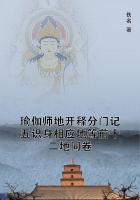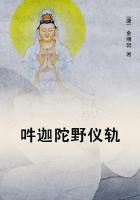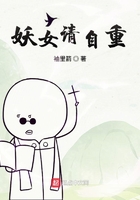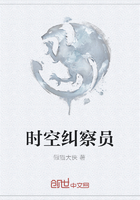"Every object comes into consciousness in a twofold way, as simply thought of and as admitted or denied.The relation is analogous to that which is assumed by most philosophers(by Kant no less than by Aristotle) to obtain between mere thought and desire.Nothing is ever desired without being thought of; but the desiring is nevertheless a second quite new and peculiar form of relation to the object, a second quite new way of receiving it into consciousness.No more is anything judged which is not thought of too.But we must insist that, so soon as the object of a thought becomes the object of an assenting or rejecting judgment, our consciousness steps into an entirely new relation towards it.It is then twice present in consciousness, as thought of, and as held for real or denied ; just as when desire awakens for it, it is both thought and simultaneously desired." (P.266.)
The commonplace doctrine of 'judgment' is that it consists in the combination of 'ideas' by a 'copula' into a 'proposition,' which may be of various sorts, as a formative, negative, hypothetical, etc.But who does not see that in a disbelieved or doubted or interrogative or conditional proposition, the ideas are combined in the same identical way in which they are in a proposition which is solidly believed? The way in which the ideas are combined with inner constitution the thoughts object or content.That object is sometimes an articulated whole with relations between its parts, amongst which relations, that of predicate to subject may be one.
But when we have got our object with its inner constitution thus defined in a proposition, then the question comes up regarding the object as a whole: 'Is it a real object? is this proposition a true proposition or not?' And in the answer Yes to this question lies that new psychic act which Brentano calls 'judgment,' but which I prefer to call 'belief.'
In every proposition, then, so far as it is believed, questioned, or disbelieved, four elements are to be distinguished, the subject, the predicate, and their relation(of whatever sort it be) -- these form the object of belief -- and finally the psychic attitude in which our mind stands towards the proposition taken as a whole-and this is the belief itself.
Admitting, then, that this attitude is a state of consciousness sui generis , about which nothing more can be said in the way of internal analysis, let us proceed to the second way of studying the subject of belief: Under what circumstances do we think things real? We shall soon see how much matter this gives us to discuss.THE VARIOUS ORDERS OF REALITY.
Suppose a new-born mind, entirely blank and waiting for experience to begin.Suppose that it begins in the forms of visual impression (whether faint or vivid is immaterial) of a lighted candle against a dark background, and nothing else, so that whilst this image lasts it constitutes the entire universe known to the mind in question.Suppose, moreover (to simplify the hypothesis), that the candle is only imaginary, and that no 'original'
of it is recognized by us psychologists outside.Will this hallucinatory candle be believed in, will it have a real existence for the mind?
What possible sense (for that mind) would a suspicion have that the candle was not real? What would doubt or disbelief of it imply? When we , the onlooking psychologists, say the candle is unreal, we mean something quite definite, viz., that there is a world known to us which is
real, and to which we perceive that the candle does not belong; it belongs exclusively to that individual mind, has no status anywhere else, etc.
It exists, to be sure, in a fashion, for it forms the content of that mind's hallucination; but the hallucination itself, though unquestionably it is a sort of existing fact, has no knowledge of other facts; and since those other facts are the realities par excellence for us, and the only things we believe in, the candle is simply outside of our reality and belief altogether.
By the hypothesis, however, the mind which sees the candle can spin no such considerations as these about it, for of other facts, actual or possible, it has no inkling whatever.That candle is its all, its absolute.
Its entire faculty of attention is absorbed by it.It is, it is that ; it is there ; no other possible candle, or quality of this candle, no other possible place, or possible object in the place, no alternative, in short, suggests itself as even conceivable; so how can the mind help believing the candle real? The supposition that it might possibly not do so is, under the supposed conditions, unintelligible.
This is what Spinonza long ago announced:
"Let us conceive a boy," he said, " imagining to himself a horse, and taking note of nothing else.As this imagination involves the existence of the horse, and the boy has no perception which annuls its resistance , he will necessarily contemplate the horse as present, nor will he be able to doubt of its existence, however little certain of it he maybe.I deny that a man in so far as he imagines affirms nothing.
For what is it to imagine a winged horse but to affirm that, the horse has wings? For if the mind had nothing before it but the winged horse it would contemplate the same as present, would have no cause to doubt of its existence, nor any power of dissenting from its existence, unless the imagination of the winged horse were joined to an idea which contradicted its existence."(Ethics, 11, 49, Scholium.)
The sense that anything we think of is unreal can only come, then, when that thing is contradicted by some other thing of which we think.Any object which remains uncontradicted is ipso facto believed and posited as absolute reality.
Now, how comes it that one thing thought of can be contradicted by another?
It cannot unless it begins the quarrel by saying something inadmissible about that other.Take the mind with the candle, or the boy with the horse.















